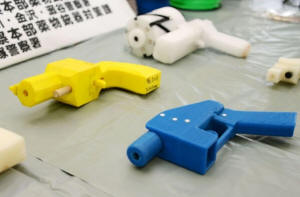|
3-D printed gun blueprints for sale after
U.S. court order, group says
 Send a link to a friend
Send a link to a friend
 [August 29, 2018]
By Tina Bellon [August 29, 2018]
By Tina Bellon
(Reuters) - A Texas-based group that a U.S.
federal judge had barred from issuing blueprints for 3-D printed plastic
guns on the internet said on Tuesday it has made the firearm designs
available for sale.
Cody Wilson, founder of Defense Distributed, said at a news conference
in Austin, Texas that he would sell the files and ship them to buyers on
a flash drive.
"Today I want to clarify, anyone who wants these files will get them,"
Wilson said. "I'll sell them. I'll ship them."
The files could previously be downloaded for free, but U.S. District
Judge Robert Lasnik in Seattle, Washington, on Monday issued a
nationwide injunction that blocked online distribution of 3-D printed
gun files.
Josh Blackman, a lawyer for Wilson, said in a statement on Tuesday that
the court expressly allowed Wilson to mail files.
Lasnik did not immediately respond to a request for comment.
Monday's decision blocked a settlement between the Trump administration
and Defense Distributed, which argued that the U.S. Constitution
guaranteed access to the online blueprints under the First Amendment
right to free speech and the Second Amendment right to bear arms.

"Wilson is trying to push the boundaries over what the U.S. Constitution
protects and the court will have to clarify whether the injunction goes
far enough to cover flash drives," said Timothy Lytton, a law professor
at Georgia State University who has written a book on gun litigation.
Files available on Defense Distributed's website included blueprints of
components for a version of the AR-15 semi-automatic assault rifle, used
in several U.S. mass shootings. They were available for purchase at a
suggested price of $10 each.
A group of 19 U.S. states and the District of Columbia sued the U.S.
government in July, arguing that publishing the blueprints would allow
criminals easy access to weapons. They said the Trump administration had
failed to explain why it settled the case.
[to top of second column]
|

Seized plastic handguns which were created using 3D printing
technology are displayed at Kanagawa police station in Yokohama,
south of Tokyo, in this photo taken by Kyodo May 8, 2014.
REUTERS/Kyodo

"We knew this fight wouldn't end with yesterday's court order, and
this is just the latest attempt by Cody Wilson to put his own
selfish, asinine interests ahead of public safety," said Avery
Gardiner, co-president of the Brady Campaign to Prevent Gun
Violence, one of the gun control advocacy groups opposing the
blueprints as part of the litigation.
Gardiner in a statement said her group would continue to work with
state AGs to prevent access to the files, but declined to comment on
whether the group would take additional legal steps.
The U.S. State Department, which had previously banned the
blueprints as a national security risk and a violation of arms
trafficking regulations, did not respond to repeated requests for
comment.
Gun control proponents are concerned the weapons made from 3-D
printers will be untraceable, undetectable "ghost" firearms that
threaten global security. Some gun rights groups say the technology
is expensive, the guns unreliable and the threat overblown. They
also say undetectable guns wholly made of plastic are illegal in the
United States.
(Reporting by Tina Bellon; Editing by Bill Berkrot and David
Gregorio)
[© 2018 Thomson Reuters. All rights
reserved.]
Copyright 2018 Reuters. All rights reserved. This material may not be published,
broadcast, rewritten or redistributed.
Thompson Reuters is solely responsible for this content. |